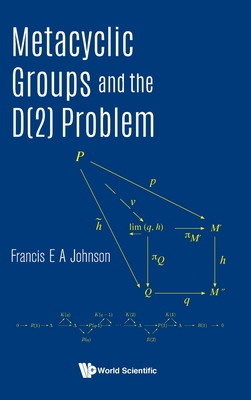The D(2) problem is a fundamental problem in low dimensional topology. In broad terms, it asks when a three-dimensional space can be continuously deformed into a two-dimensional space without changing the essential algebraic properties of the spaces involved.The problem is parametrized by the fundamental group of the spaces involved; that is, each group G has its own D(2) problem whose difficulty varies considerably with the individual nature of G.This book solves the D(2) problem for a large, possibly infinite, number of finite metacyclic groups G(p, q). Prior to this the author had solved the D(2) problem for the groups G(p, 2). However, for q > 2, the only previously known solutions were for the groups G(7, 3), G(5, 4) and G(7, 6), all done by difficult direct calculation by two of the author's students, Jonathan Remez (2011) and Jason Vittis (2019).The method employed is heavily algebraic and involves precise analysis of the integral representation theory of G(p, q). Some noteworthy features are a new cancellation theory of modules (Chapters 10 and 11) and a simplified treatment (Chapters 5 and 12) of the author's theory of Swan homomorphisms.
The D(2) problem is a fundamental problem in low dimensional topology. In broad terms, it asks when a three-dimensional space can be continuously deformed into a two-dimensional space without changing the essential algebraic properties of the spaces involved.The problem is parametrized by the fundamental group of the spaces involved; that is, each group G has its own D(2) problem whose difficulty varies considerably with the individual nature of G.This book solves the D(2) problem for a large, possibly infinite, number of finite metacyclic groups G(p, q). Prior to this the author had solved the D(2) problem for the groups G(p, 2). However, for q > 2, the only previously known solutions were for the groups G(7, 3), G(5, 4) and G(7, 6), all done by difficult direct calculation by two of the author''s students, Jonathan Remez (2011) and Jason Vittis (2019).The method employed is heavily algebraic and involves precise analysis of the integral representation theory of G(p, q). Some noteworthy features are a new cancellation theory of modules (Chapters 10 and 11) and a simplified treatment (Chapters 5 and 12) of the author''s theory of Swan homomorphisms.
Get Metacyclic Groups And The D(2) Problem by at the best price and quality guranteed only at Werezi Africa largest book ecommerce store. The book was published by World Scientific Publishing Co Pte Ltd and it has pages. Enjoy Shopping Best Offers & Deals on books Online from Werezi - Receive at your doorstep - Fast Delivery - Secure mode of Payment
 Jacket, Women
Jacket, Women
 Woolend Jacket
Woolend Jacket
 Western denim
Western denim
 Mini Dresss
Mini Dresss
 Jacket, Women
Jacket, Women
 Woolend Jacket
Woolend Jacket
 Western denim
Western denim
 Mini Dresss
Mini Dresss
 Jacket, Women
Jacket, Women
 Woolend Jacket
Woolend Jacket
 Western denim
Western denim
 Mini Dresss
Mini Dresss
 Jacket, Women
Jacket, Women
 Woolend Jacket
Woolend Jacket
 Western denim
Western denim
 Mini Dresss
Mini Dresss
 Jacket, Women
Jacket, Women
 Woolend Jacket
Woolend Jacket
 Western denim
Western denim
 Mini Dresss
Mini Dresss






























































